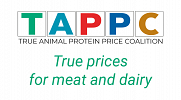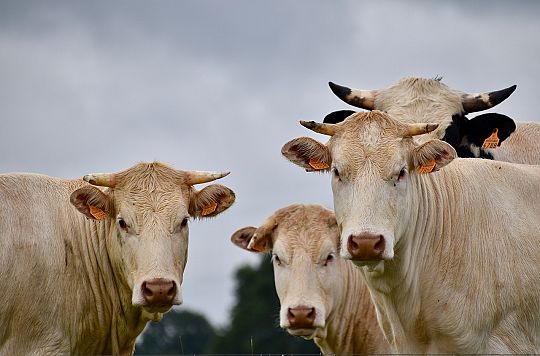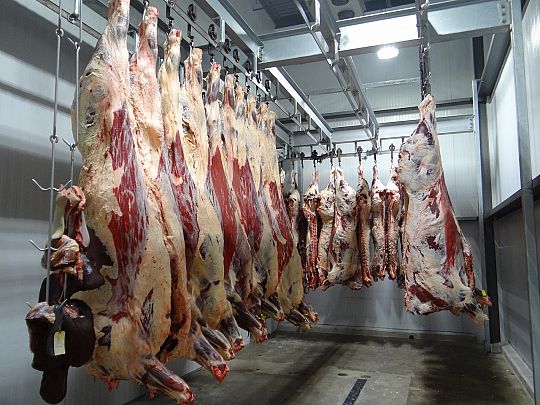Open letter to Global Livestock and Meat Industries on Climate
Today a week before the UN Climate Conference starts in Baku, an Open Letter was sent to Juan José Grigera Naón, Chairman of the International Meat Secretariat (IMS), their National Members and Meat sector stakeholders. The topic is the climate responsibilities of the sector, with proposals for pricing livestock emissions, as is urged by the World Bank, African Ministers and 100+ NGO's. African countries suffer most from the impacts of climate change, partly caused by increasing emissions of the global livestock sector The letter, was sent by TAPP Coalition and ACAI (True Animal Protein Price Coalition and African Climate Action Initiative).
OPEN LETTER TO LIVESTOCK AND MEAT SECTOR STAKEHOLDERS IN HIGH-INCOME COUNTRIES
To: International Meat Secretariat Board, its Members and Meat Sector Stakeholders
Subject: Urgent Call to Address the Climate and Ecological Impacts of Meat production
Date: 6th November 2024
Dear IMS Board and Members, and other meat sector stakeholders,
Meat is a food product most people like. It includes healthy ingredients and millions of people work in the livestock and meat sector. However, recent studies highlight that the livestock sector is also a major contributor to greenhouse gas (GHG) emissions, deforestation, land degradation, and biodiversity loss, while increasing healthcare costs and non-communicable diseases in countries with overconsumption[1]. In Europe for instance, the financial value of animal sourced food production is 206 billion euro, while external social and environmental costs are 3,5 times larger[2] (737 billion euro (439 billion diet related health costs and 298 billion euro air pollution and land use costs). This trajectory is not sustainable nor profitable. Globally, agriculture-related emissions account for over 33% of all GHG emissions, with livestock production contributing 14.5% to 20%, generating the majority of global food-related GHG emissions[3]. When we look closely at methane, nitrous oxide and carbon dioxide emissions – all by-products of intensive livestock farming – the need for urgent reform becomes even clearer. Our reliance on current practices accelerates climate change and contributes to a range of other environmental and public health risks that we can not afford to ignore. In OECD countries and China, high demand for meat has led to an over-reliance on large-scale industrial farming methods that prioritise short-term yield over long-term ecological stability. These methods contribute to water scarcity, soil depletion and runoff pollution, which exacerbate the cycle of environmental degradation. This trend impacts economies and societies around the world as regions become increasingly vulnerable to drought, desertification and other climate-related crises.
It is within our collective power to drive transformative change, also to benefit the meat sector. Increased meat prices would help farmers and meat companies to deal with the challenges and compensate damage costs by the sector. Existing lowest prices strategies can be replaced over time by collective agreements on fair pricing, including all environmental costs. The TAPP/ACAI Coalition advocates for a fair and transparent system for pricing GHG emissions in the agri-food sector. Pricing emissions will help internalize environmental costs and encourage the adoption of more sustainable practices since pricing or tax revenues can help finance farmers to improve sustainability. The World Bank[4] and African Ministers agree such pricing mechanisms are needed in high income countries[5]. Ministers and 100+ NGO’s signed a COP29 Agreement on GHG-emission pricing in the agri-food sector. This agreement can also be signed by actors in your sector[6]. We cannot achieve change without your active participation and partnership.
We urge livestock and meat associations, exporters, processors and businesses to:
1. Recognize and act at the scale of the problem: Let’s recognize that maintaining the status quo in meat production and consumption threatens our ecosystems and our food security;
2. Advocate for the implementation of GHG pricing mechanisms: Pricing livestock emissions can catalyze change, foster innovation in sustainable practices and encourage transitions to regenerative agriculture. GHG-emission pricing can start in high income countries and China. This could be a Food-sector-ETS with revenues to benefit farmers and consumers. Farmer-friendly meat taxes can be an alternative. Recycling of tax revenues can benefit farmers and consumers and contribute for at least 20% to the new UN Loss and Damage Fund (open to private sector donations). We also refer to the COP16 Biodiversity Cali Fund[7] for the pharmaceutical sector with a contribution of 0,1% of their revenue for a Biodiversity Fund. The global meat sector has a revenue of over 1300 billion USD[8]. So, 0,1% of revenue generates 1,3 billion USD/year. A voluntary or tax contribution of 10 dollarcent per 100 gram meat in OECD countries and China would generate 186 billion USD/year[9].
3. Transition to sustainable production models: Prioritize practices that protect soil health, reduce deforestation and decrease methane emissions. Explore alternative protein sources and invest in research that enables scalable and sustainable production;
4. Engage in transparent dialogue and collaboration: The path to sustainability requires an open and inclusive conversation with governments, civil society, and the private sector to ensure that policy frameworks align with our shared climate goals.
The aviation sector took the responsibility to ask governments to limit GHG-emissions from their sector[10]. The oil and gas sector took the responsibility to ask governments to start CO2-pricing of fossil fuels[11]. What will the International Meat Secretariat do to take responsibility ? Together, we can make a difference by reducing the environmental footprint of meat production and reshaping our food systems toward resilience and equity. We would appreciate the opportunity to discuss how we can work together to shape an industry that values sustainability, transparency, and accountability. Please consider this urgent call. The climate and our global ecosystems depend on our willingness to act now.
Sincerely, on behalf of ACAI,
Jeroom Remmers,
Director TAPP Coalition
[1] https://www.leap.ox.ac.uk/article/health-motivated-taxes-on-red-and-processed-meat-a-modelling-study-on-optimal-tax-levels-and [2] External costs of animal sourced food in the EU - EU Agenda
[3] United Nations, “Food and Climate Change: Healthy Diets for a Healthier Planet | United Nations,” 2022, https://www.un.org/en/climatechange/science/climate-issues/food
and: https://www.fao.org/policy-support/tools-and-publications/resources-details/en/c/1235389/ https://www.fao.org/news/story/en/item/197623/icode and: Oliver Milman, “Meat Accounts for Nearly 60% of All Greenhouse Gases from Food Production, Study Finds,” The Guardian, September 14, 2021, https://www.theguardian.com/environment/2021/sep/13/meat-greenhouses-gases-food-production-study
[6]: https://docs.google.com/forms/d/e/1FAIpQLScRqhEAsvrvAG7yKJbdkYZASJaRPZUC3a4lcToIKH1N3FqsJg/viewform
or send an email to info@tappcoalitie.nl
[7] COP16 biodiversity summit, https://www.vox.com/down-to-earth/381602/cop16-dsi-digital-sequence-information-explained
[8] https://www.globaldata.com/store/report/meat-market-growth-analysis/
[9] A GHG-Pricing of $0,10 per 100 grams of meat could generate approx. $186bn annually. Calculations based on 71,4 kg per capita/year in the OECD countries, and 61,98 kg per capita/year in China and 2023 population statistics of 1,385bn in OECD and 1,409bn in China.
[10] https://www.icao.int/environmental-protection/CORSIA/Pages/default.aspx
[11] In 2015, six major energy companies incl. Shell, BP, Statoil, Eni and Total sent a letter to ask for carbon pricing and emission trading https://www.bp.com/en/global/corporate/news-and-insights/press-releases/oil-and-gas-majors-call-for-carbon-pricing.html



